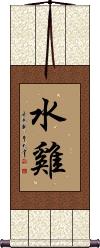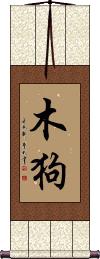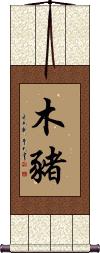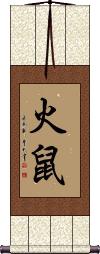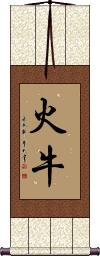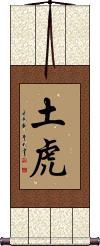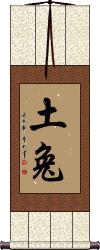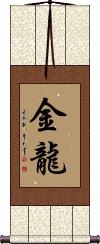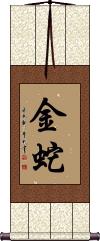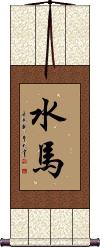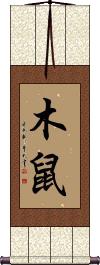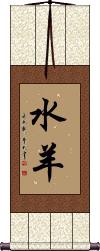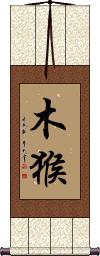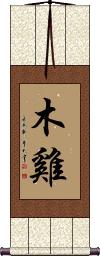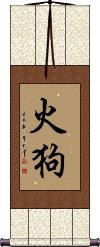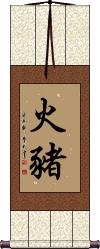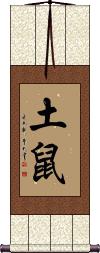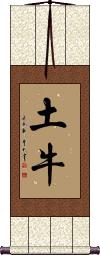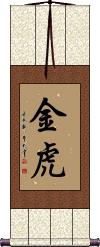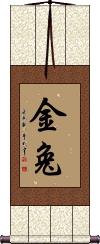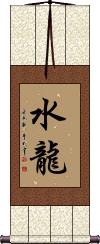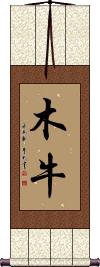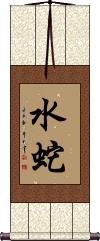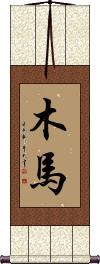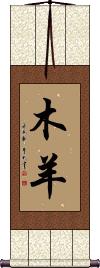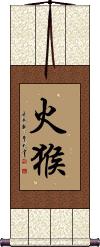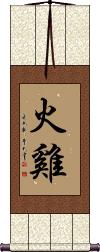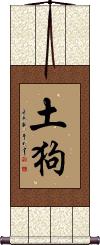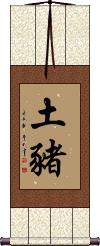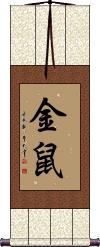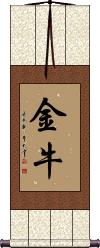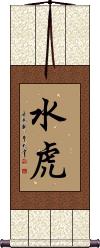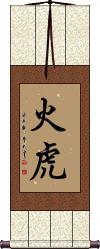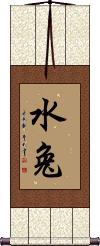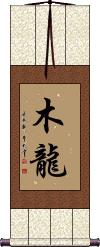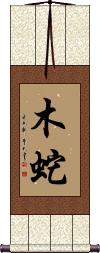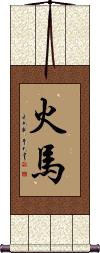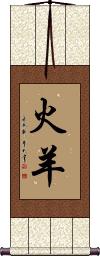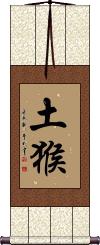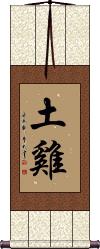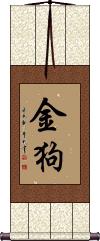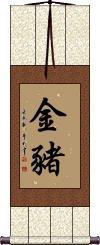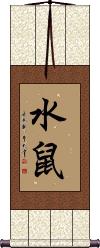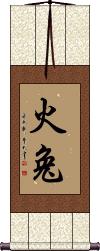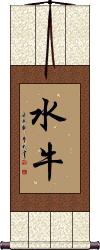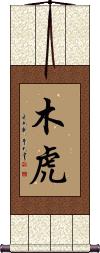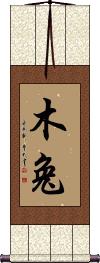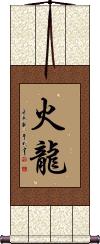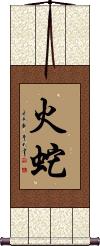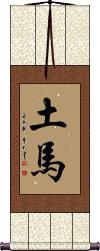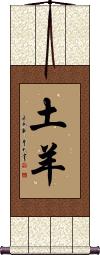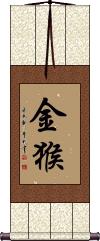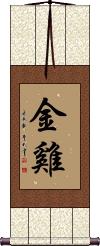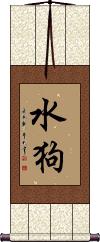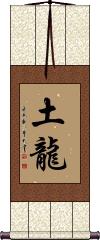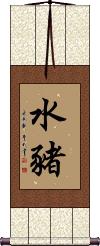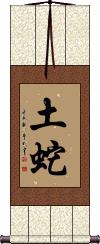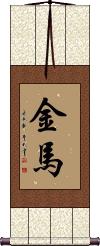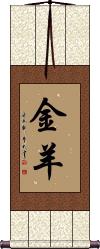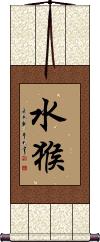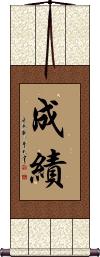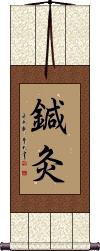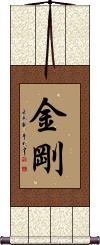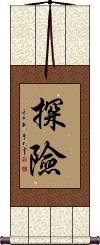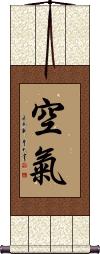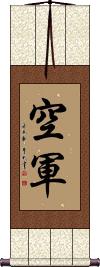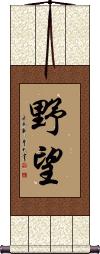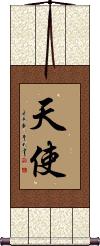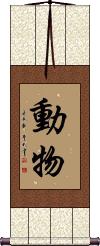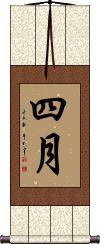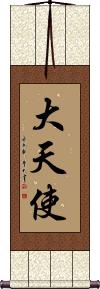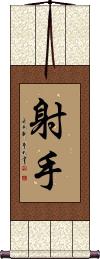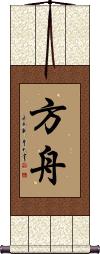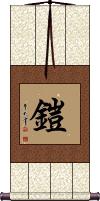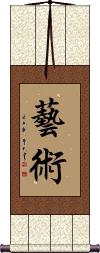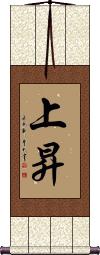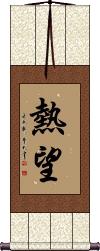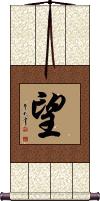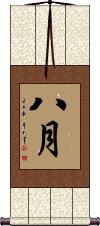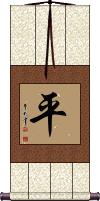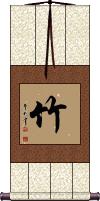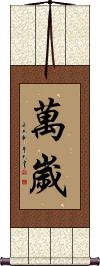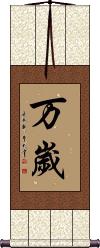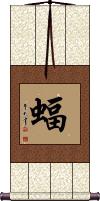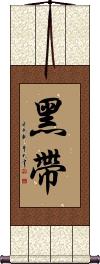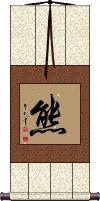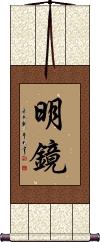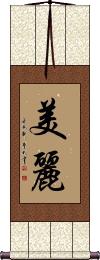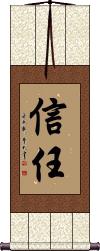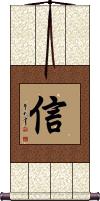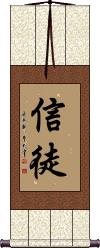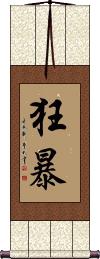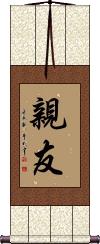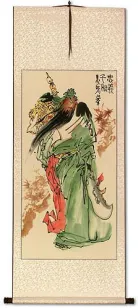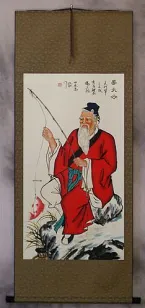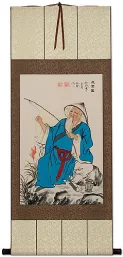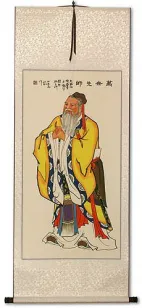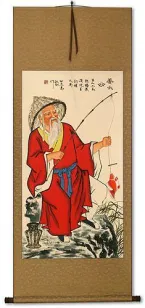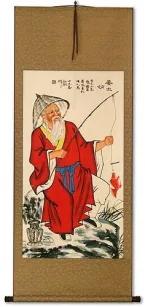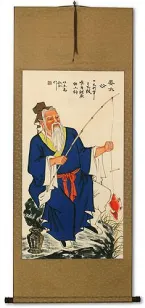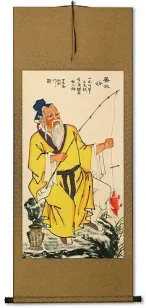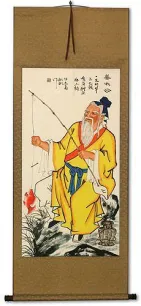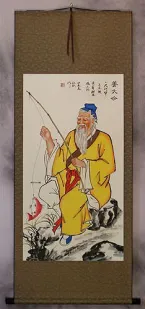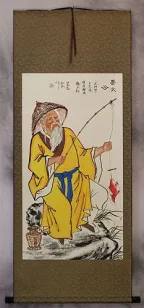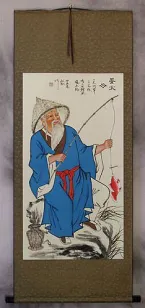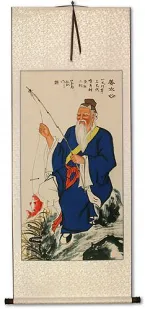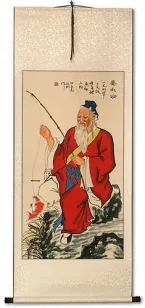Many custom options...
And formats...

Not what you want?
Try other similar-meaning words, fewer words, or just one word.
50 Years Old in Chinese / Japanese...
Buy a 50 Years Old calligraphy wall scroll here!
Personalize your custom “50 Years Old” project by clicking the button next to your favorite “50 Years Old” title below...
Switched to secondary search mode due to lack of results using primary.
These secondary results may not be very accurate. Try a different but similar meaning word or phrase for better results. Or...
Look up 50 Years Old in my Japanese Kanji & Chinese Character Dictionary(My dictionary is a different system then the calligraphy search you just tried)
If you want a special phrase, word, title, name, or proverb, feel free to contact me, and I will translate your custom calligraphy idea for you.
1. One Day Seems Like 1000 Years
2. 100 Years of Happy Marriage
4. Wood Dog
6. Fire Rat
7. Fire Ox/Bull
8. Earth Tiger
9. Earth Rabbit
12. Water Horse
13. Wood Rat
14. Water Goat/Sheep
15. Wood Monkey
16. Wood Rooster
17. Fire Dog
18. Fire Pig/Boar
19. Earth Rat
20. Earth Ox/Bull
23. Water Dragon
24. Wood Ox/Bull
25. Water Snake
26. Wood Horse
27. Wood Goat/Sheep
28. Fire Monkey
29. Fire Rooster
30. Earth Dog
31. Earth Pig/Boar
32. Golden/Metal Rat
34. Water Tiger
35. Fire Tiger
36. Water Rabbit
37. Wood Dragon
38. Wood Snake
39. Fire Horse
40. Fire Goat/Sheep
41. Earth Monkey
42. Earth Rooster
43. Golden/Metal Dog
45. Water Rat
46. Fire Rabbit
47. Water Ox/Bull
48. Wood Tiger
49. Wood Rabbit
50. Fire Dragon
51. Fire Snake
52. Earth Horse
53. Earth Goat/Sheep
56. Water Dog
57. Earth Dragon
58. Water Pig/Boar
59. Earth Snake
62. Water Monkey
64. Achievement
65. Acupuncture and Moxibustion
67. Adventure
68. Air / Atmosphere
69. Air Force
71. Ambition
72. Angel / Messenger of Heaven
73. Animal Kingdom
74. Animals
75. April
77. Archer
78. Architect
79. Ark
80. Armor
81. Art
82. Ascend
85. August
86. Balance / Peace
87. Bamboo
88. Banzai / Wansui
89. Banzai
90. Bat
91. Black Belt
92. Bear
95. Beautiful
96. Belief / Trust
98. Believer
One Day Seems Like 1000 Years
一日千秋 is a Japanese and Chinese proverb about missing someone.
一日千秋 is often used to express how hard it is to wait for someone's return or to be away from someone.
Some will translate this as “one day feels like a very long time” or “waiting for someone (something) is hard.”
You might see this romanized as a single word, Ichijitsusenshuu, or as “Ichijitsu Senshuu” from Japanese.
If you break down the characters one-by-one, we get:
一 = one/a
日 = day/sun (can also represent time or date)
千 = 1000/thousand
秋 = autumn/fall
Together, 千秋 can mean “autumn comes thousand times” (or 1000 years). It can also be read as 1000 periods of time.
However, it relays the idea of heartache as you wait for someone you miss.
100 Years of Happy Marriage
Water Rooster
The Year of the Water Rooster
水雞 is Water Rooster in Chinese.
In the Chinese zodiac and sexagenary (60-year) cycle, this combination occurs in years that include 1873, 1933, 1993, and 2053.
In the sexagenary cycle, this year is represented by 癸酉.
See Also: Rooster
Wood Dog
The Year of the Wood Dog
木狗 is Wood Dog in Chinese.
In the Chinese zodiac and sexagenary (60-year) cycle, this combination occurs in years that include 1874, 1934, 1994, and 2054.
In the sexagenary cycle, this year is represented by 甲戌.
See Also: Dog
Wood Pig/Boar
The Year of the Wood Pig/Boar
木豬 is Wood Pig/Boar in Chinese.
In the Chinese zodiac and sexagenary (60-year) cycle, this combination occurs in years that include 1875, 1935, 1995, and 2055.
In the sexagenary cycle, this year is represented by 乙亥.
See Also: Pig/Boar
Fire Rat
The Year of the Fire Rat
火鼠 is Fire Rat in Chinese.
In the Chinese zodiac and sexagenary (60-year) cycle, this combination occurs in years that include 1876, 1936, 1996, and 2056.
In the sexagenary cycle, this year is represented by 丙子.
See Also: Rat
Fire Ox/Bull
The Year of the Fire Ox/Bull
火牛 is Fire Ox/Bull in Chinese.
In the Chinese zodiac and sexagenary (60-year) cycle, this combination occurs in years that include 1877, 1937, 1997, and 2057.
In the sexagenary cycle, this year is represented by 丁丑.
See Also: Ox/Bull
Earth Tiger
The Year of the Earth Tiger
土虎 is Earth Tiger in Chinese.
In the Chinese zodiac and sexagenary (60-year) cycle, this combination occurs in years that include 1878, 1938, 1998, and 2058.
In the sexagenary cycle, this year is represented by 戊寅.
See Also: Tiger
Earth Rabbit
The Year of the Earth Rabbit
土兔 is Earth Rabbit in Chinese.
In the Chinese zodiac and sexagenary (60-year) cycle, this combination occurs in years that include 1879, 1939, 1999, and 2059.
In the sexagenary cycle, this year is represented by 己卯.
See Also: Rabbit
Golden/Metal Dragon
The Year of the Golden/Metal Dragon
金龍 is Golden/Metal Dragon in Chinese.
In the Chinese zodiac and sexagenary (60-year) cycle, this combination occurs in years that include 1880, 1940, 2000, and 2060.
In the sexagenary cycle, this year is represented by 庚辰.
See Also: Dragon
Golden/Metal Snake
The Year of the Gold Snake
金蛇 is Golden/Metal Snake in Chinese.
In the Chinese zodiac and sexagenary (60-year) cycle, this combination occurs in years that include 1881, 1941, 2001, and 2061.
In the sexagenary cycle, this year is represented by 辛巳.
See Also: Snake
Water Horse
The Year of the Water Horse
水馬 is Water Horse in Chinese.
In the Chinese zodiac and sexagenary (60-year) cycle, this combination occurs in years that include 1882, 1942, 2002, and 2062.
In the sexagenary cycle, this year is represented by 壬午.
See Also: Horse
Wood Rat
The Year of the Wood Rat
木鼠 is Wood Rat in Chinese.
In the Chinese zodiac and sexagenary (60-year) cycle, this combination occurs in years that include 1864, 1924, 1984, and 2044.
In the sexagenary cycle, this year is represented by 甲子.
See Also: Rat
Water Goat/Sheep
The Year of the Water Goat/Sheep
水羊 is Water Goat/Sheep in Chinese.
In the Chinese zodiac and sexagenary (60-year) cycle, this combination occurs in years that include 1883, 1943, 2003, and 2063.
In the sexagenary cycle, this year is represented by 癸未.
See Also: Goat/Sheep
Wood Monkey
The Year of the Wood Monkey
木猴 is Wood Monkey in Chinese.
In the Chinese zodiac and sexagenary (60-year) cycle, this combination occurs in years that include 1884, 1944, 2004, and 2064.
In the sexagenary cycle, this year is represented by 甲申.
See Also: Monkey
Wood Rooster
The Year of the Wood Rooster
木雞 is Wood Rooster in Chinese.
In the Chinese zodiac and sexagenary (60-year) cycle, this combination occurs in years that include 1885, 1945, 2005, and 2065.
In the sexagenary cycle, this year is represented by 乙酉.
See Also: Rooster
Fire Dog
The Year of the Fire Dog
火狗 is Fire Dog in Chinese.
In the Chinese zodiac and sexagenary (60-year) cycle, this combination occurs in years that include 1886, 1946, 2006, and 2066.
In the sexagenary cycle, this year is represented by 丙戌.
See Also: Dog
Fire Pig/Boar
The Year of the Fire Pig/Boar
火豬 is Fire Pig/Boar in Chinese.
In the Chinese zodiac and sexagenary (60-year) cycle, this combination occurs in years that include 1887, 1947, 2007, and 2067.
In the sexagenary cycle, this year is represented by 丁亥.
See Also: Pig/Boar
Earth Rat
The Year of the Earth Rat
土鼠 is Earth Rat in Chinese.
In the Chinese zodiac and sexagenary (60-year) cycle, this combination occurs in years that include 1888, 1948, 2008, and 2068.
In the sexagenary cycle, this year is represented by 戊子.
See Also: Rat
Earth Ox/Bull
The Year of the Earth Ox/Bull
土牛 is Earth Ox/Bull in Chinese.
In the Chinese zodiac and sexagenary (60-year) cycle, this combination occurs in years that include 1889, 1949, 2009, and 2069.
In the sexagenary cycle, this year is represented by 己丑.
See Also: Ox/Bull
Golden/Metal Tiger
The Year of the Golden/Metal Tiger
金虎 is Golden/Metal Tiger in Chinese.
In the Chinese zodiac and sexagenary (60-year) cycle, this combination occurs in years that include 1890, 1950, 2010, and 2070.
In the sexagenary cycle, this year is represented by 庚寅.
See Also: Tiger
Golden/Metal Rabbit
The Year of the Golden/Metal Rabbit
金兔 is Golden/Metal Rabbit in Chinese.
In the Chinese zodiac and sexagenary (60-year) cycle, this combination occurs in years that include 1891, 1951, 2011, and 2071.
In the sexagenary cycle, this year is represented by 辛卯.
See Also: Rabbit
Water Dragon
The Year of the Water Dragon
水龍 is Water Dragon in Chinese.
In the Chinese zodiac and sexagenary (60-year) cycle, this combination occurs in years that include 1892, 1952, 2012, and 2072.
In the sexagenary cycle, this year is represented by 壬辰.
See Also: Dragon
Wood Ox/Bull
The Year of the Wood Ox/Bull
木牛 is Wood Ox/Bull in Chinese.
In the Chinese zodiac and sexagenary (60-year) cycle, this combination occurs in years that include 1865, 1925, 1985, and 2045.
In the sexagenary cycle, this year is represented by 乙丑.
See Also: Ox/Bull
Water Snake
The Year of the Water Snake
水蛇 is Water Snake in Chinese.
In the Chinese zodiac and sexagenary (60-year) cycle, this combination occurs in years that include 1893, 1953, 2013, and 2073.
In the sexagenary cycle, this year is represented by 癸巳.
See Also: Snake
Wood Horse
The Year of the Wood Horse
Wood Goat/Sheep
The Year of the Wood Goat/Sheep
木羊 is Wood Goat/Sheep in Chinese.
In the Chinese zodiac and sexagenary (60-year) cycle, this combination occurs in years that include 1895, 1955, 2015, and 2075.
In the sexagenary cycle, this year is represented by 乙未.
See Also: Goat/Sheep
Fire Monkey
The Year of the Fire Monkey
火猴 is Fire Monkey in Chinese.
In the Chinese zodiac and sexagenary (60-year) cycle, this combination occurs in years that include 1896, 1956, 2016, and 2076.
In the sexagenary cycle, this year is represented by 丙申.
See Also: Monkey
Fire Rooster
The Year of the Fire Rooster
火雞 is Fire Rooster in Chinese.
In the Chinese zodiac and sexagenary (60-year) cycle, this combination occurs in years that include 1897, 1957, 2017, and 2077.
In the sexagenary cycle, this year is represented by 丁酉.
See Also: Rooster
Earth Dog
The Year of the Earth Dog
土狗 is Earth Dog in Chinese.
In the Chinese zodiac and sexagenary (60-year) cycle, this combination occurs in years that include 1898, 1958, 2018, and 2078.
In the sexagenary cycle, this year is represented by 戊戌.
See Also: Dog
Earth Pig/Boar
The Year of the Earth Pig/Boar
土豬 is Earth Pig/Boar in Chinese.
In the Chinese zodiac and sexagenary (60-year) cycle, this combination occurs in years that include 1899, 1959, 2019, and 2079.
In the sexagenary cycle, this year is represented by 己亥.
See Also: Pig/Boar
Golden/Metal Rat
The Year of the Golden/Metal Rat
金鼠 is Golden/Metal Rat in Chinese.
In the Chinese zodiac and sexagenary (60-year) cycle, this combination occurs in years that include 1900, 1960, 2020, and 2080.
In the sexagenary cycle, this year is represented by 庚子.
See Also: Rat
Golden/Metal Ox/Bull
The Year of the Golden/Metal Ox/Bull
金牛 is Golden/Metal Ox/Bull in Chinese.
In the Chinese zodiac and sexagenary (60-year) cycle, this combination occurs in years that include 1901, 1961, 2021, and 2081.
In the sexagenary cycle, this year is represented by 辛丑.
See Also: Ox/Bull
Water Tiger
The Year of the Water Tiger
水虎 is Water Tiger in Chinese.
In the Chinese zodiac and sexagenary (60-year) cycle, this combination occurs in years that include 1902, 1962, 2022, and 2082.
In the sexagenary cycle, this year is represented by 壬寅.
See Also: Tiger
Fire Tiger
The Year of the Fire Tiger
火虎 is Fire Tiger in Chinese.
In the Chinese zodiac and sexagenary (60-year) cycle, this combination occurs in years that include 1866, 1926, 1986, and 2046.
In the sexagenary cycle, this year is represented by 丙寅.
See Also: Tiger
Water Rabbit
The Year of the Water Rabbit
水兔 is Water Rabbit in Chinese.
In the Chinese zodiac and sexagenary (60-year) cycle, this combination occurs in years that include 1903, 1963, 2023, and 2083.
In the sexagenary cycle, this year is represented by 癸卯.
See Also: Rabbit
Wood Dragon
The Year of the Wood Dragon
木龍 is Wood Dragon in Chinese.
In the Chinese zodiac and sexagenary (60-year) cycle, this combination occurs in years that include 1904, 1964, 2024, and 2084.
In the sexagenary cycle, this year is represented by 甲辰.
See Also: Dragon
Wood Snake
The Year of the Wood Snake
木蛇 is Wood Snake in Chinese.
In the Chinese zodiac and sexagenary (60-year) cycle, this combination occurs in years that include 1905, 1965, 2025, and 2085.
In the sexagenary cycle, this year is represented by 乙巳.
See Also: Snake
Fire Horse
The Year of the Fire Horse
火馬 is Fire Horse in Chinese.
In the Chinese zodiac and sexagenary (60-year) cycle, this combination occurs in years that include 1906, 1966, 2026, and 2086.
In the sexagenary cycle, this year is represented by 丙午.
See Also: Horse
Fire Goat/Sheep
The Year of the Fire Goat/Sheep
火羊 is Fire Goat/Sheep in Chinese.
In the Chinese zodiac and sexagenary (60-year) cycle, this combination occurs in years that include 1907, 1967, 2027, and 2087.
In the sexagenary cycle, this year is represented by 丁未.
See Also: Goat/Sheep
Earth Monkey
The Year of the Earth Monkey
土猴 is Earth Monkey in Chinese.
In the Chinese zodiac and sexagenary (60-year) cycle, this combination occurs in years that include 1908, 1968, 2028, and 2088.
In the sexagenary cycle, this year is represented by 戊申.
See Also: Monkey
Earth Rooster
The Year of the Earth Rooster
土雞 is Earth Rooster in Chinese.
In the Chinese zodiac and sexagenary (60-year) cycle, this combination occurs in years that include 1909, 1969, 2029, and 2089.
In the sexagenary cycle, this year is represented by 己酉.
See Also: Rooster
Golden/Metal Dog
The Year of the Golden/Metal Dog
金狗 is Golden/Metal Dog in Chinese.
In the Chinese zodiac and sexagenary (60-year) cycle, this combination occurs in years that include 1910, 1970, 2030, and 2090.
In the sexagenary cycle, this year is represented by 庚戌.
See Also: Dog
Golden/Metal Pig/Boar
The Year of the Golden/Metal Pig/Boar
金豬 is Golden/Metal Pig/Boar in Chinese.
In the Chinese zodiac and sexagenary (60-year) cycle, this combination occurs in years that include 1911, 1971, 2031, and 2091.
In the sexagenary cycle, this year is represented by 辛亥.
See Also: Pig/Boar
Water Rat
The Year of the Water Rat
水鼠 is Water Rat in Chinese.
In the Chinese zodiac and sexagenary (60-year) cycle, this combination occurs in years that include 1912, 1972, 2032, and 2092.
In the sexagenary cycle, this year is represented by 壬子.
See Also: Rat
Fire Rabbit
The Year of the Fire Rabbit
火兔 is Fire Rabbit in Chinese.
In the Chinese zodiac and sexagenary (60-year) cycle, this combination occurs in years that include 1867, 1927, 1987, and 2047.
In the sexagenary cycle, this year is represented by 丁卯.
See Also: Rabbit
Water Ox/Bull
The Year of the Water Ox/Bull
水牛 is Water Ox/Bull in Chinese.
In the Chinese zodiac and sexagenary (60-year) cycle, this combination occurs in years that include 1913, 1973, 2033, and 2093.
In the sexagenary cycle, this year is represented by 癸丑.
See Also: Ox/Bull
Wood Tiger
The Year of the Wood Tiger
木虎 is Wood Tiger in Chinese.
In the Chinese zodiac and sexagenary (60-year) cycle, this combination occurs in years that include 1914, 1974, 2034, and 2094.
In the sexagenary cycle, this year is represented by 甲寅.
See Also: Tiger
Wood Rabbit
The Year of the Wood Rabbit
木兔 is Wood Rabbit in Chinese.
In the Chinese zodiac and sexagenary (60-year) cycle, this combination occurs in years that include 1915, 1975, 2035, and 2095.
In the sexagenary cycle, this year is represented by 乙卯.
See Also: Rabbit
Fire Dragon
The Year of the Fire Dragon
火龍 is Fire Dragon in Chinese.
In the Chinese zodiac and sexagenary (60-year) cycle, this combination occurs in years that include 1916, 1976, 2036, and 2096.
In the sexagenary cycle, this year is represented by 丙辰.
See Also: Dragon
Fire Snake
The Year of the Fire Snake
火蛇 is Fire Snake in Chinese.
In the Chinese zodiac and sexagenary (60-year) cycle, this combination occurs in years that include 1917, 1977, 2037, and 2097.
In the sexagenary cycle, this year is represented by 丁巳.
See Also: Snake
Earth Horse
The Year of the Earth Horse
土馬 is Earth Horse in Chinese.
In the Chinese zodiac and sexagenary (60-year) cycle, this combination occurs in years that include 1918, 1978, 2038, and 2098.
In the sexagenary cycle, this year is represented by 戊午.
See Also: Horse
Earth Goat/Sheep
The Year of the Earth Goat/Sheep
土羊 is Earth Goat/Sheep in Chinese.
In the Chinese zodiac and sexagenary (60-year) cycle, this combination occurs in years that include 1919, 1979, 2039, and 2099.
In the sexagenary cycle, this year is represented by 己未.
See Also: Goat/Sheep
Golden/Metal Monkey
The Year of the Golden/Metal Monkey
金猴 is Golden/Metal Monkey in Chinese.
In the Chinese zodiac and sexagenary (60-year) cycle, this combination occurs in years that include 1920, 1980, 2040, and 2100.
In the sexagenary cycle, this year is represented by 庚申.
See Also: Monkey
Golden/Metal Rooster
The Year of the Golden/Metal Rooster
金雞 is Golden/Metal Rooster in Chinese.
In the Chinese zodiac and sexagenary (60-year) cycle, this combination occurs in years that include 1921, 1981, 2041, and 2101.
In the sexagenary cycle, this year is represented by 辛酉.
See Also: Rooster
Water Dog
The Year of the Water Dog
水狗 is Water Dog in Chinese.
In the Chinese zodiac and sexagenary (60-year) cycle, this combination occurs in years that include 1922, 1982, 2042, and 2102.
In the sexagenary cycle, this year is represented by 壬戌.
See Also: Dog
Earth Dragon
The Year of the Earth Dragon
土龍 is Earth Dragon in Chinese.
In the Chinese zodiac and sexagenary (60-year) cycle, this combination occurs in years that include 1868, 1928, 1988, and 2048.
In the sexagenary cycle, this year is represented by 戊辰.
See Also: Dragon
Water Pig/Boar
The Year of the Water Pig/Boar
水豬 is Water Pig/Boar in Chinese.
In the Chinese zodiac and sexagenary (60-year) cycle, this combination occurs in years that include 1923, 1983, 2043, and 2103.
In the sexagenary cycle, this year is represented by 癸亥.
See Also: Pig/Boar
Earth Snake
The Year of the Earth Snake
土蛇 is Earth Snake in Chinese.
In the Chinese zodiac and sexagenary (60-year) cycle, this combination occurs in years that include 1869, 1929, 1989, and 2049.
In the sexagenary cycle, this year is represented by 己巳.
See Also: Snake
Golden/Metal Horse
The Year of the Golden/Metal Horse
金馬 is Golden/Metal Horse in Chinese.
In the Chinese zodiac and sexagenary (60-year) cycle, this combination occurs in years that include 1870, 1930, 1990, and 2050.
In the sexagenary cycle, this year is represented by 庚午.
See Also: Horse
Golden/Metal Goat/Sheep
The Year of the Golden/Metal Goat/Sheep
金羊 is Golden/Metal Goat/Sheep in Chinese.
In the Chinese zodiac and sexagenary (60-year) cycle, this combination occurs in years that include 1871, 1931, 1991, and 2051.
In the sexagenary cycle, this year is represented by 辛未.
See Also: Goat/Sheep
Water Monkey
The Year of the Water Monkey
水猴 is Water Monkey in Chinese.
In the Chinese zodiac and sexagenary (60-year) cycle, this combination occurs in years that include 1872, 1932, 1992, and 2052.
In the sexagenary cycle, this year is represented by 壬申.
See Also: Monkey
Abundance and Prosperity
繁榮富裕 is a proverb about “Prosperity and Abundance.”
This presents and reinforces the ideas of being prosperous, a booming economy, well-to-do, well-off, wealthy, riches, and opulence.
While this is the ancient/traditional Chinese way to write this, most Japanese can fully read and understand it. It's also the correct form of old Korean Hanja (though few Koreans of the current generation will be able to read this).
See Also: Good Fortune
Achievement
成績 is a Chinese, Japanese, and old Korean Hanja word that means achievement.
Depending on the context, it can also mean performance records, grades, or results.
Acupuncture and Moxibustion
鍼灸 is the Chinese, Japanese Kanji, and old Korean Hanja word for acupuncture-moxibustion.
Adamantine / King Kong
金剛 can translate as adamantine from Chinese, Japanese, and old Korean.
Other meanings and translations can include diamond, thunderbolt, Indra's indestructible weapon, a Buddhist symbol of the indestructible truth, Vajra (a mythical weapon), guardian deity, hardness, indestructibility, power, the least frangible of minerals.
The Chinese pronunciation of “Jīn Gāng” became the loanword used in English as “King Kong.” You can see King Kong as the indestructible ape guardian deity depending on how you read the story.
Adventure
If you lead a life of adventure (like I do), a 探險 wall scroll is for you.
Alone, the first character can mean “to explore,” “to search out,” or “to scout.” The second character holds the meanings of “dangerous” and “rugged.” Together these two characters create the word that means “adventure” or “to explore.”
探険 is a modern Japanese Kanji version, but it more precisely means exploration or expedition rather than adventure. 探險 is the old/ancient Japanese version used before WWII. Let us know if you want the modern Japanese version instead.
See Also: Bon Voyage | Travel
Air / Atmosphere
空氣 means air or atmosphere in Chinese, Japanese Kanji, and old Korean Hanja.
This is an unusual title for an Asian calligraphy wall scroll, but many of our western customers have requested it.
![]() While 空氣 is common in Chinese and Korean Hanja (and ancient Japanese Kanji); please note that in modern Japanese, the second character is written as 気, with slightly fewer strokes. If you want the modern Japanese version, please click on the character to the right. Both versions are understood by native Chinese, Japanese, and many (but not all) Korean people. You should choose the appropriate version based on the intended audience for your calligraphy artwork.
While 空氣 is common in Chinese and Korean Hanja (and ancient Japanese Kanji); please note that in modern Japanese, the second character is written as 気, with slightly fewer strokes. If you want the modern Japanese version, please click on the character to the right. Both versions are understood by native Chinese, Japanese, and many (but not all) Korean people. You should choose the appropriate version based on the intended audience for your calligraphy artwork.
Air Force
空軍 is “Air Force” in Chinese, Japanese Kanji, and old Korean Hanja.
If you're an airman, this could be the title for you.
All Hopes Fulfilled
萬事如意 is a Chinese and old Korean proverb that means to have all one's wishes.
When speaking to someone, it's a way to say best wishes, all the best, may all your hopes be fulfilled, or may everything go well.
On your wall as calligraphy, it's meant to inspire all your wishes, hopes, dreams, and life to go well or come true.
Ambition
Angel / Messenger of Heaven
天使 is the meaning of Angel in Chinese, Japanese Kanji, and old Korean Hanja.
The first character means heaven. The second means messenger. Together it makes sense that we are talking about angels as Heaven's Messengers.
If you are an “Angel Junkie,” this may be the wall scroll for you.
I also think it's a great choice if your name happens to be Angel.
See Also: Angel
Animal Kingdom
動物王國 is literally what it says.
There is even a TV show in China that is similar to Wild Kingdom or what you would currently see on the Discovery Channel that has this same title.
For your information: In the Chinese way of thinking, the Tiger is the king of the animal kingdom (lions are not native to China, so the tiger took the role that we have given to the lion in our western way of thinking).
The modern Japanese version has a slight variation on the last character (国 instead of 國). Let me know if you want the modern Japanese version (國 would be considered the old or traditional version).
Animals
動物 is the way to write “animals” in Chinese characters, Japanese Kanji, and old Korean Hanja.
The first character means “moving,” and the second means “things.”
So animals are “moving things” in these Asian languages.
April
Fourth Month
This is April in Chinese, Japanese Kanji, and old Korean Hanja.
This was originally the fourth month of the Chinese lunar year, now used for the fourth month of the Gregorian calendar (also known as the Western or Christian calendar). 四月 literally mean “fourth month” or “fourth moon.”
Archangel / Arch Angel
大天使 is the title Archangel in Chinese characters, Japanese Kanji, and old Korean Hanja.
The first character means big or great (in this case, it means “arch”).
The second means heaven (or sky).
The last means messenger.
The second and third characters together make the title for angel, which is literally “Heaven's Messenger.”
This title would be understood as “The Chief of all Angels,” or “The Great Angel.” Some might even say it's the boss of Angels.
See Also: Angel
Archer
射手 means archer, shooter, or marksman in Chinese, Japanese Kanji, and old Korean Hanja.
Depending on the context, it can also mean “goal-getter” in Chinese. This would also be the word for a bowman.
射手 is modern in Asia, meaning that it's only been in use for a few hundred years. However, the more ancient version of the archer is often not even recognized by the current generation of Chinese and Japanese people.
The first character means “shoot” or “fire” (in the context of a gun or bow). It's also a suffix for radioactive things (in the context of chemistry) - radioactive things “fire off” electrons. In Japanese, the first Kanji is a short name and suffix for archery.
The second character means “hand,” but the hand can also mean a person, in the same way, that a “farmhand” is a person in English.
Architect
方舟 is the Chinese, Japanese, and old Korean name for an ark (as in Noah's Ark).
The literal translation is the square boat.
Armor
藝術 is a Chinese, Japanese, and old Korean Hanja word that means art, as in fine art, the arts, or artwork.
Ascend
上昇 means to rise up, to go up, or to ascend in Chinese, Japanese Kanji, and old Korean Hanja.
If you are rising, ascending, or climbing, this is the word for you.
In the older Buddhist context, this means to ascend, with the implication that the destination is the heavenly realm.
Aspire / Burning Desire
熱望 is a Chinese, Japanese Kanji, and old Korean Hanja word that means, to aspire, longing for, or burning desire.
The first character means hot, heated, or burning.
The second character means hope, expectations, aspiration, or desire.
Great Expectations
望 holds the ideas of ambition, hope, desire, aspiring to, expectations, looking towards, to gaze (into the distance), and in some contexts, full moon rising.
望 is one of those single characters that is vague but in that vagueness, it also means many things.
望 is a whole word in Chinese and old Korean but is seldom seen alone in Japanese. Still, it holds the meanings noted above in all three languages.
August
Eighth Month
八月 is the month of August in Chinese, Japanese Kanji, and old Korean Hanja.
八月 literally means “eighth month” or “eighth moon.”
In Japanese, this can also be the female given name, Yatsuki, in much the same way August can be a female given name in English.
Balance / Peace
平 is a single character that means balance in Chinese but it's not too direct or too specific about what kind of balance.
Chinese people often like calligraphy art that is a little vague or mysterious. In this way, you can decide what it means to you, and you'll be right.
平 is also part of a word that means peace in Chinese, Japanese, and old Korean.
Some alternate translations of this single character include: balanced, peaceful, calm, equal, even, level, smooth, or flat.
Note that in Japanese, this just means “level” or “flat” by itself (not the best choice for balance if your audience is Japanese).
Bamboo
竹 is the character that means bamboo in Chinese, Japanese Kanji, and old Korean Hanja.
In Asian cultures, bamboo is often seen as a symbol of a noble gentleman (tall, straight, and honest).
There are also some multi-character bamboo words that regard individual bamboo plants, species of bamboo, bamboo as lumber, and edible bamboo shoots. However, this single character seems most appropriate for a wall scroll and covers the whole category of Asian bamboo.
Banzai / Wansui
Old Japanese / Traditional Chinese & Korean
萬歲 is the traditional Chinese, Korean Hanja, and ancient Japanese way of writing banzai.
In modern times, the first character was simplified in Japan and China. So you might want to select the other entry for universal readability.
While it has become a popular, if not an odd, thing to scream as you jump out of an airplane (preferably with a parachute attached), banzai is actually a very old Asian way to say “hooray.” The Japanese word “banzai” comes from the Chinese word “wan sui,” which means “The age of 10,000 years.” It is actually a wish that the Emperor or the Empire live that long.
Imagine long ago when the Emperor made a rare public appearance. 萬歲 is what all people would yell to their leader in respect.
So if you like it as a hooray, or you want to wish someone that they live for 10,000 years, this is the calligraphy for you.
Other translations include Cheers! (not the drinking kind), hurrah!, long live [name]!, and congratulations!
To other things with banzai in their names, I am still waiting for the promised sequel to Buckaroo Banzai.
Notes: Sometimes people confuse banzai with bonsai. A bonsai is a miniature tree. They have nothing to do with each other.
Banzai
Modern Japanese Version
万歲 is the modern Japanese way to write banzai.
We've made two almost identical entries for this word, with just a variation on the first character. In the last century, 萬 was simplified to 万 in Japan and China. The new generation will expect it to be written as 万 but the old generation can still read the more traditional 萬 form. You must make your determination as to what version is best for you. If your audience is mostly Japanese, I suggest 万歲.
While it has become a popular, if not an odd, thing to scream as you jump out of an airplane (preferably with a parachute attached), banzai is actually a very old Asian way to say “hooray.” The Japanese word “banzai” comes from the Chinese word “wan sui” which means “The age of 10,000 years.” It is actually a wish that the Emperor or the Empire live that long.
Imagine long ago when the Emperor made a rare public appearance. This is what all of the people would yell to their leader in respect.
So if you like it as a hooray, or you want to wish someone that they live for 10,000 years, this is the calligraphy for you.
To other things with banzai in their names, I am still waiting for the promised sequel to Buckaroo Banzai.
Other translations: hurrah, long life, congratulations, cheers, live long.
Notes: Sometimes people confuse banzai with bonsai. A bonsai is a miniature tree. They have nothing to do with each other. Further, Bonzai is not a word at all - although it would make a great name for a calcium supplement for older people.
蝠 is the simplest way to write bat in Chinese and old Korean Hanja.
This also means bat in Japanese but is almost never written alone like this (it's often part of other titles for vampire bats or fruit bats).
In Chinese culture, the bat is a good luck charm, as the pronunciation is very similar to the word for “good luck” or “good fortune.” The character for bat (蝠) even looks like the good luck (福) character.
Black Belt
黑帶 is “black belt” in Chinese.
Many will argue whether rank systems that include a “black belt” are used in pure Chinese martial arts systems. The argument goes that it's more a Japanese idea merged into the western versions of Chinese martial arts. However, in Wushu (often referred to as Kung Fu), it's said that all students started with white belts. Over the years of training, the white belt would get dirty until finally appearing black with filth. Thus, more advanced students had darker belts.
If you want this title in Chinese, this would be the form.
![]() Often, the second character is written like the image to the right. If you like this version, click on this character instead of the button above.
Often, the second character is written like the image to the right. If you like this version, click on this character instead of the button above.
Bear
Animal
熊 is the way to write “bear” (as in the animal) in Chinese, Japanese Kanji, and old Korean Hanja.
If you are a bear fanatic, this is the wall scroll for you.
熊 is not specific to species, such as panda bears, polar bears, brown bears, etc.
If you need a more specific title, just post a contact me.
See Also: Panda
Mirror: Beautiful Clarity
While 明鏡 means mirror in Chinese, Japanese Kanji, and old Korean Hanja, it's commonly used as a metaphor for something beautiful and bright or something that provides clarity and insight.
Beautiful Woman Proverb
沈魚落雁 is an old proverb that literally means “fish sink, goose alights.”
...But this takes some explaining. This is a proverb from Zhuangzi (莊子), who lived in the late 4th century BC.
This figuratively refers to female beauty that is so captivating that even the birds and beasts take notice.
Perhaps a better and more accurate way to describe this is to say that it speaks of the charms of a uniquely beautiful woman who is so beautiful that fish stay on the bottom of the water and flying wild geese fall from the sky in shame.
This proverb is so famous that it is also known and used in Japan (same characters, different pronunciation).
Note: This can also be written 沉魚落雁 instead of 沈魚落雁 (just the first character varies slightly).
Beautiful
美麗 is a two-character word used often in Chinese, old Korean, and ancient Japanese to express beauty.
I've had a few requests for a “two-character beautiful,” and this is by far the best word. This is not a common word for an Asian person to want on a wall scroll. However, you will see it commonly used as an adjective in phrases, stories, and titles throughout magazines and signage in China.
美麗 can also be translated as gorgeous or lovely.
Note: 美麗 is not commonly used in modern Japan.
Belief / Trust
信任 means belief or trust in Chinese characters, old Korean Hanja, and Japanese Kanji.
It can also mean having confidence in or credence.
Believe / Faith / Trust
śraddhā
信 can mean to believe, truth, faith, fidelity, sincerity, trust, and confidence in Chinese, old Korean Hanja, and Japanese Kanji.
This single character is often part of other words with similar meanings.
It is one of the five basic tenets of Confucius.
In Chinese, it sometimes has the secondary meaning of a letter (as in the mail) depending on context but it will not be read that way when seen on a wall scroll.
In the Buddhist context, this is śraddhā (faith through hearing or being taught).
Believer
信徒 is the Chinese, Japanese Kanji, and old Korean Hanja word for “believer.”
Just as in English, this word can be used for a follower of virtually any religion.
This word can also be translated into English as layman, adherent, follower, laity, disciple, or devotee.
Rage / Frenzy / Berserk
狂暴 is rage or the idea of going berserk in Chinese, Japanese Kanji, and old Korean Hanja.
Best Friends / Buddies
親友 is the Japanese way to say “best friend.”
The first character can mean “relative” or sometimes “parents.” The second character means “friend.” Think about the close relationship that Japanese people have with their parents and relatives, and this starts to mean “close friends.”
Some Japanese-English dictionaries also translate this as “bosom friend,” “old friend,” “intimate friend,” “buddy,” “crony” or “chum.”
Note that in Chinese, this means “relatives and friends.” It's a good meaning in Chinese, but it's not quite the same as “best friends.”
Better to be Happy than Rich
安貧樂道 means “It's better to be happy than rich” in Chinese.
Even if you are poor, you should still feel satisfied in your life...
...Satisfaction, happiness and the meaning of your life come from within yourself and not from money or riches of the world.
In Chinese, there are a lot of four-character proverbs which express some very old philosophies.
Though there are only four characters on this scroll, in Chinese, the meanings often surpass the dictionary definition of each character.
In this case, you should not set your expectations too high for the money or riches you wish to have. One who sets their expectations too high is almost always disappointed. Instead, you should cherish what you have, seek to improve yourself from within, and not measure your worth by the size of your bank account.
This in-stock artwork might be what you are looking for, and ships right away...
Gallery Price: $200.00
Your Price: $88.88
Successful Chinese Character and Japanese Kanji calligraphy searches within the last few hours...


